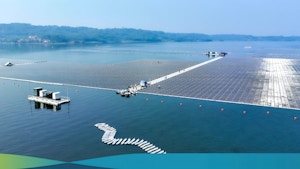Southeast Asia's Clean Energy Transition
All our latest stories. Back to Sea's Clean Energy Transition.

The bulk of funding will be used to address intermittency and variability of renewables in off-grid areas, says Asian Development Bank’s energy director Keiju Mitsuhashi. The Philippines alone will require $10 billion to improve its domestic grid.

SDG 17. Partnerships
China is Southeast Asia’s biggest public funder of clean energy with US$2.7bn in investments: study
Indonesia received the most funding from China over the last decade, according to a new report by Zero Carbon Analytics. But uncertainties caused by US-driven tariff plans could see Southeast Asian countries retract green investments, said an analyst.

SDG 7. Energy
A third of Southeast Asia’s data centres could be powered by renewable energy by 2030: study
Data centre hubs in the region can meet at least 30 per cent of their electricity demand by the end of the decade with wind and solar, without the need for battery storage, finds a new report by Ember.

SDG 12. Consumption
Data centres are reshaping the Asean Power Grid’s forecasts, say global financiers
Multilateral development banks can help derisk the costs of decarbonisation and interconnections, with tech companies like Google playing a key role as large offtakers of clean energy. But the Asean Centre of Energy needs the mandate of the region's leaders to develop feasibility studies and optimisation scenarios.

Before US tariffs, an AI-fuelled data centre boom had spurred tech giants to make big renewables bets in the region. Mounting uncertainty is prompting a "wait and see" approach, though the long game hinges on local policies, say experts.

As the United States sets unprecedented new import duties, pressure mounts on Asia to buy American natural gas to address trade imbalances. Experts urge tapping into solar and wind potential to counter economic uncertainty in the region.

SDG 9. Infrastructure
New record-high US solar tariffs leave uneven impact across Southeast Asia’s solar industry
Cambodia, Vietnam, Thailand and Malaysia's solar panel makers face varying tariff rates. Chinese manufacturers have already moved operations elsewhere, and smaller local players and workers will bear the brunt of the fallout.

Earth Day 2025 calls for action to triple clean electricity capacity by 2030. Eco-Business examines which countries in Southeast Asia are leading and lagging for clean power adoption.

SDG 13. Climate
Indonesia’s first early coal retirement raises concerns over labour rights and environmental damage compensation
The early shutting of Cirebon-1 in West Java will be a major milestone for climate finance in Indonesia. But the impact of the closure on plant workers and local communities has not been fully considered, civic society groups say.

SDG 13. Climate
Funding is not a barrier for Indonesia’s clean energy transition – it’s project viability: JETP official
State electricity firm PLN has slowed renewables deployment, says the deputy head of the country's Just Energy Transition Partnership secretariat. Investors should back captive power instead of grid-based projects, she suggests.

Company participation has surged 120 per cent since the green option programme was introduced four years ago, finds a new report. But despite demand growth, renewable energy supply remains limited.

SDG 8. Economic growth
As Malaysia cuts fossil fuel jobs, how can workers prepare for the energy transition?
Labour representatives say that Malaysia’s workers are unprepared for the energy transition, with many prioritising economic issues such as wages over sustainability. A recent report called for a national assessment of workforce readiness, as well as more awareness building and upskilling programmes.


Transforming Innovation for Sustainability Join the Ecosystem →

